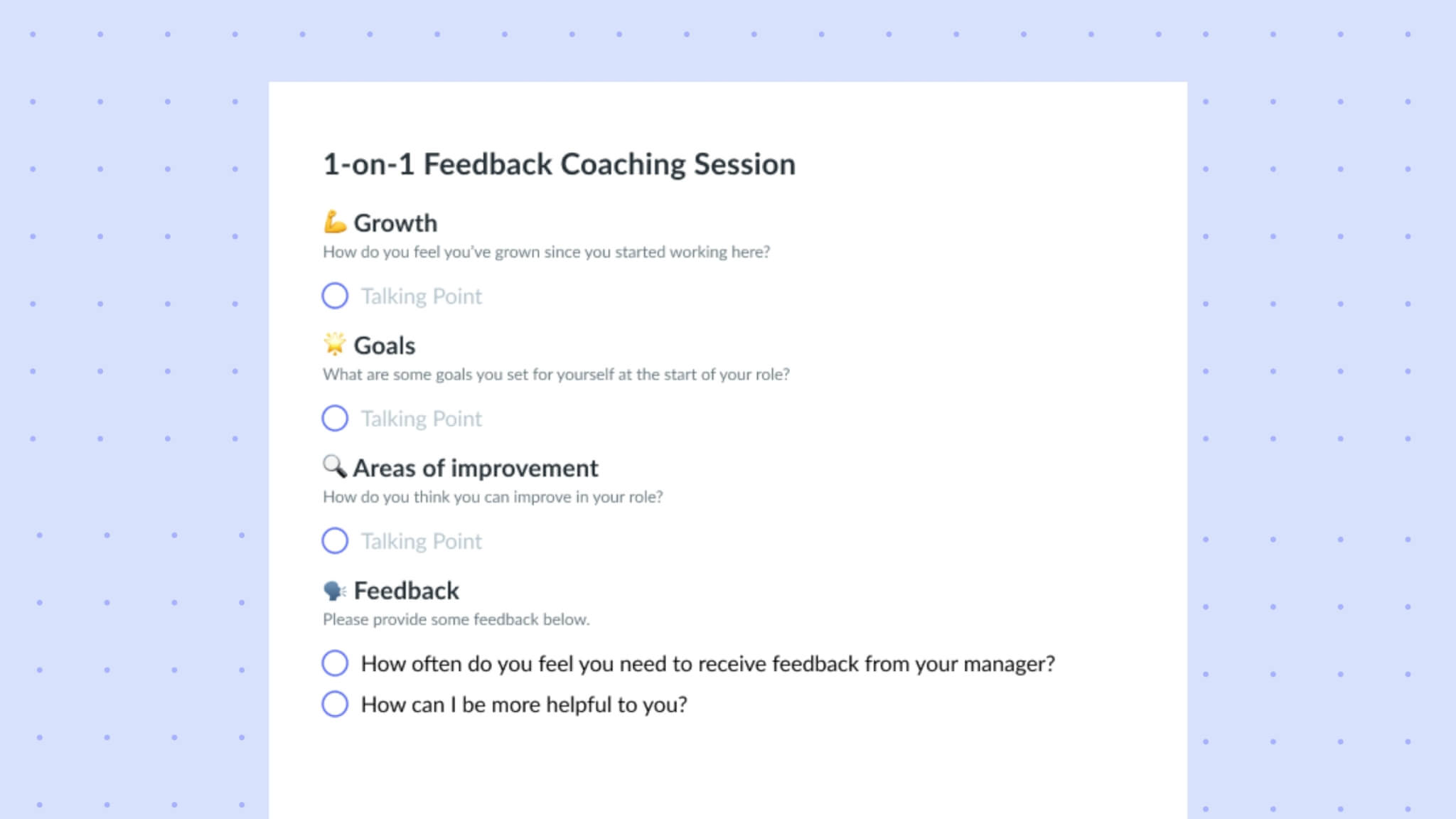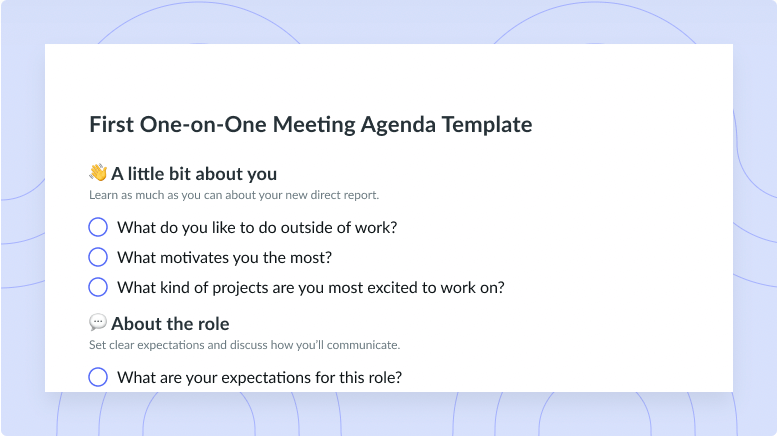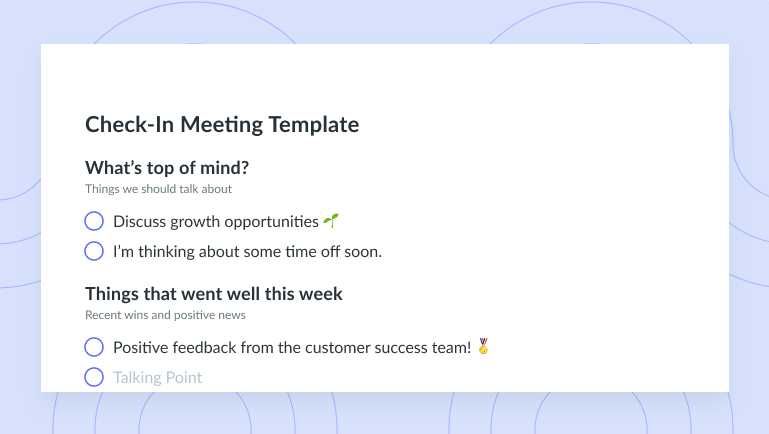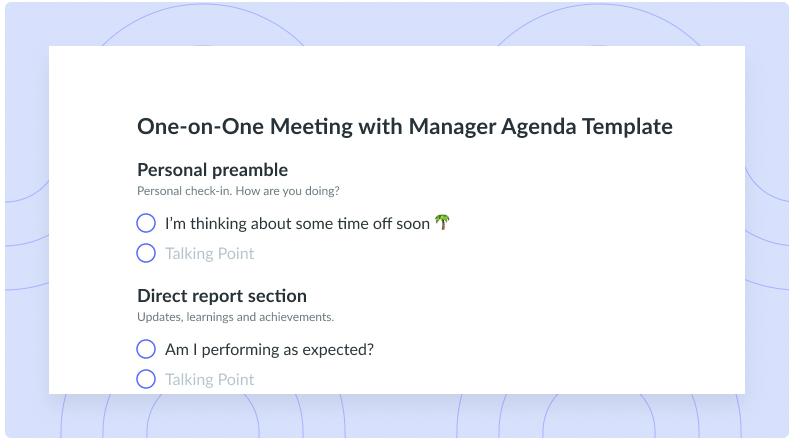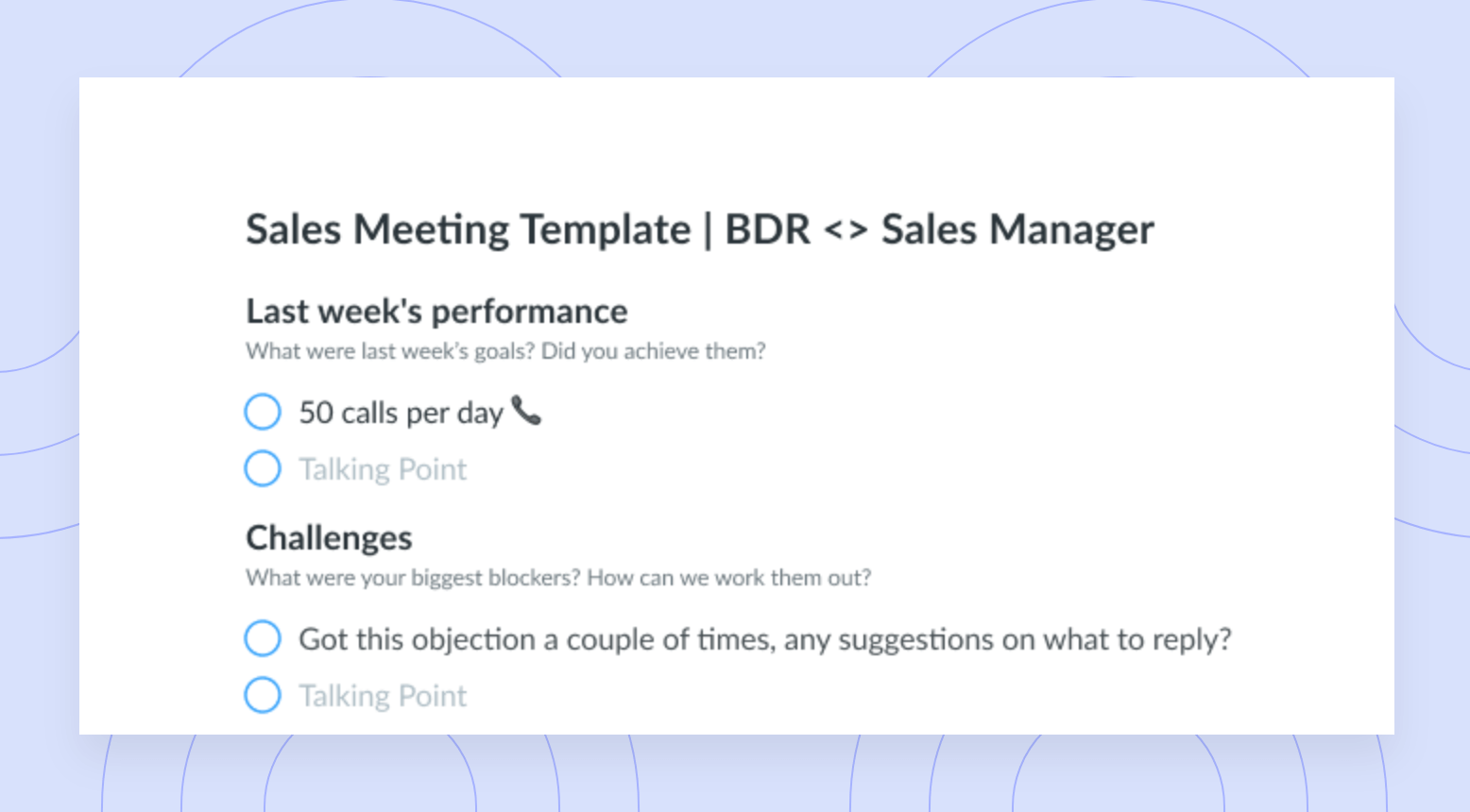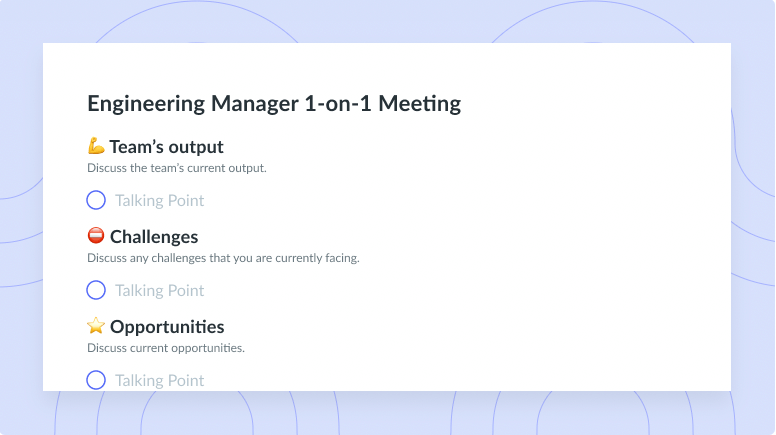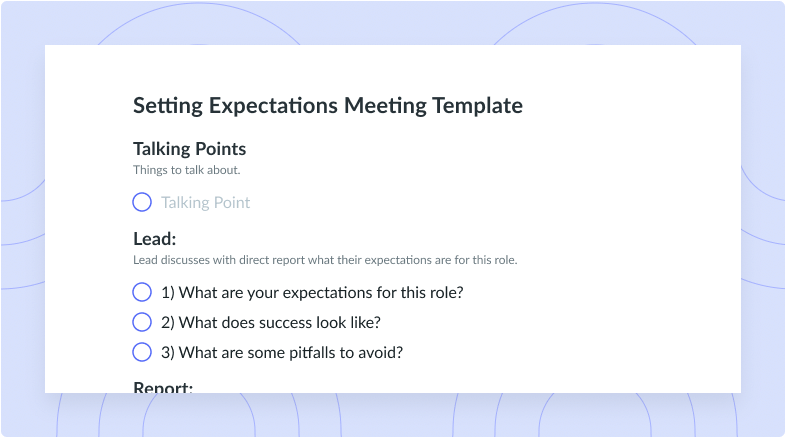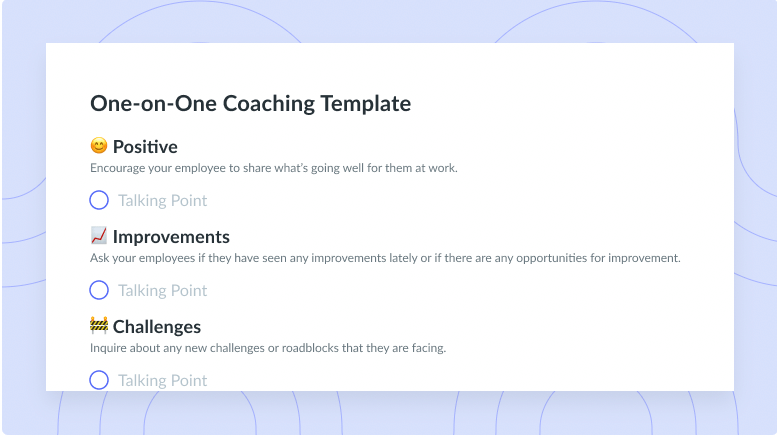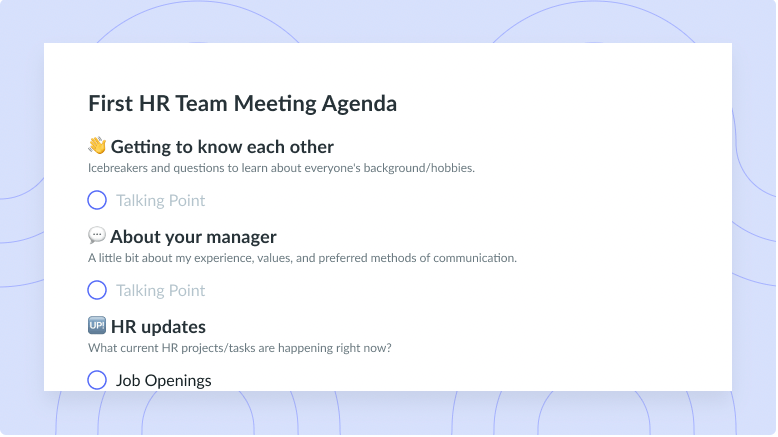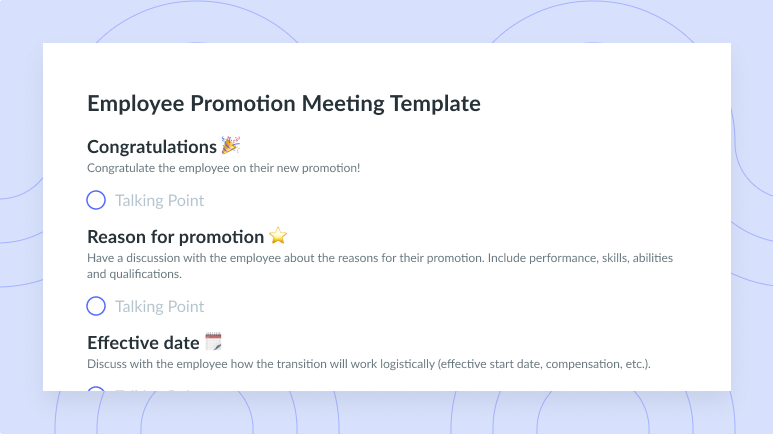One-on-One Meeting Template: Top 10 Questions and Examples
The one-on-one meeting agenda template every manager needs.
One-on-one meetings (also known as 1-on-1s, one to ones, and 1-2-1s) are the ideal scenario to foster positive work relationships, set expectations, and help your direct reports be more productive.
Having a great one-on-one meeting template in place is one of the best things you can do to have effective one on ones with your direct reports.
A one-on-one meeting template ensures efficiency, clarity, and accountability in discussions. It streamlines communication, fosters deeper connections, and maximizes the impact of valuable face-to-face time.
If you’re looking for some inspiration to improve the quality of your meetings, this post is for you.
- What is a one-on-one meeting template?
- One-on-one meeting template examples
- 10 questions to ask in your one-on-one meetings
What is a one-on-one meeting template?
A one-on-one meeting provides dedicated time to discuss priorities, challenges, and professional growth with your direct reports. Using a designated one-on-one meeting template ensures consistency and effective guidance for discussions. At Fellow, we recommend having a designated template to maintain consistency across your team and ensure that leaders are addressing the right topics.
A structured format ensures that important topics are covered efficiently within the limited time available, while serving as a reference point for tracking progress and follow-up actions. This consistent approach also encourages open communication, creating a safe space for employees to share thoughts and ideas.
One-on-one meeting template examples
First One-on-One Meeting
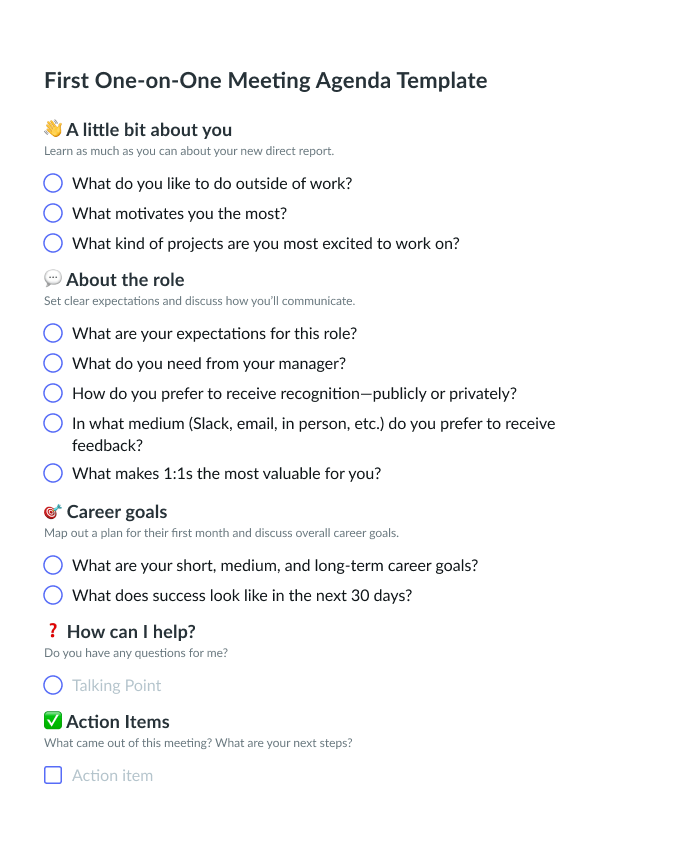
Weekly Check-in
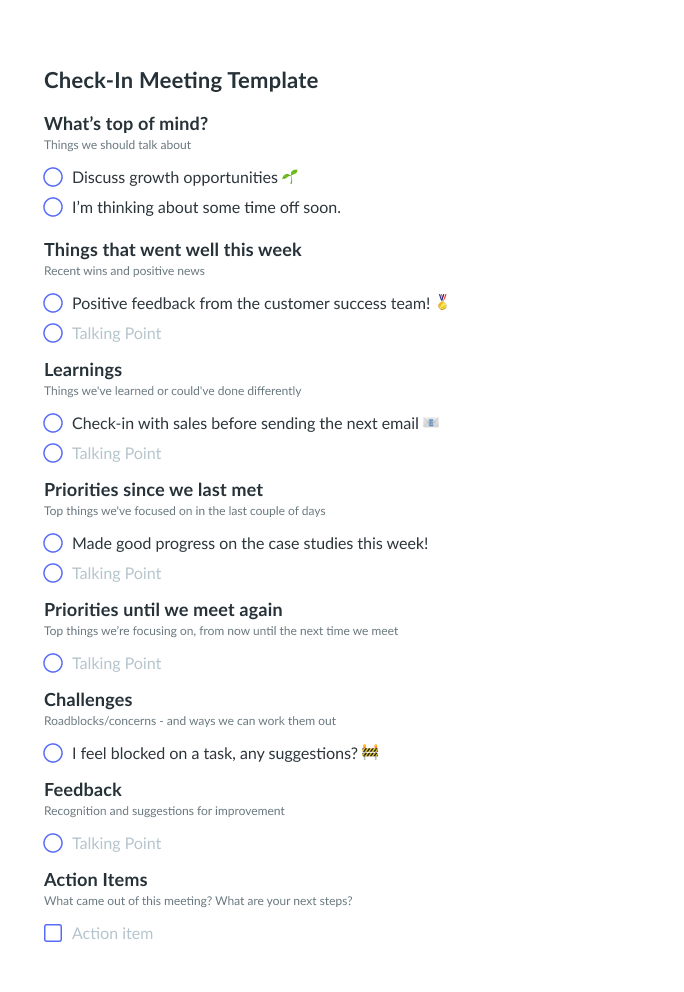
Kim Scott’s One-on-One Meeting
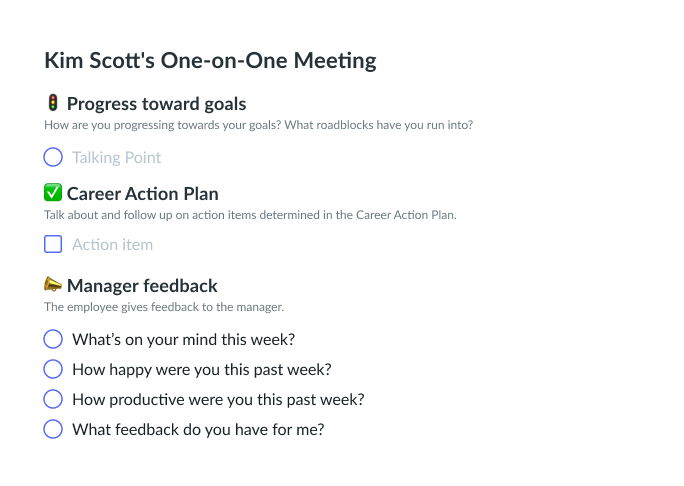
90/10 Meeting
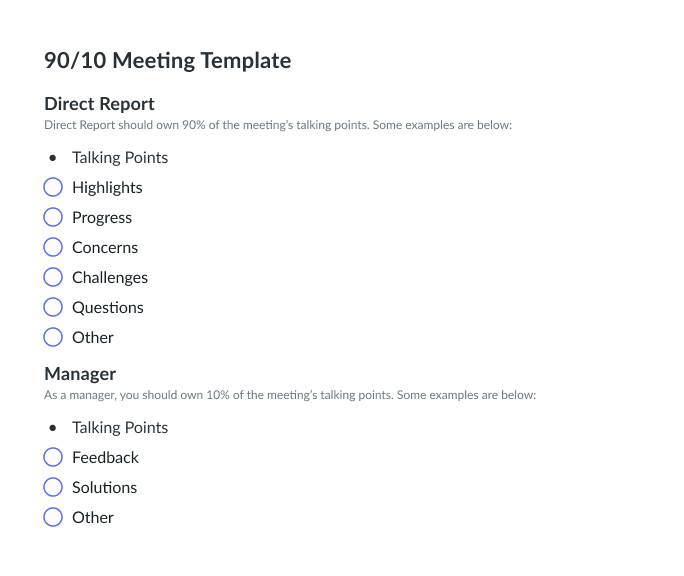
G.O.O.D 1-on-1 Meeting
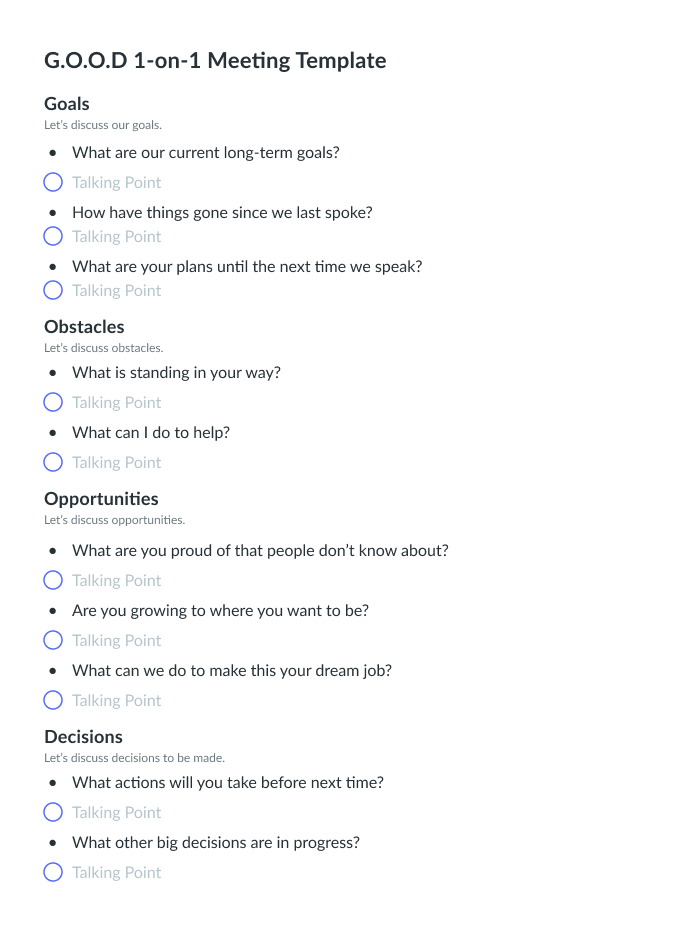
10 questions to ask in your one-on-one meetings
We recommend asking your direct report to take ownership over their one-on-one meetings with you. This means that they should be the ones in charge of adding 80% of the talking points to the agenda and leading the discussion. However, it’s a good practice to come prepared with questions that you can ask employees during this valuable time with them.
Here are the top 10 questions great managers ask to have productive and engaging one-on-one meetings with direct reports:
- How’s life outside of work?
- What are your top priorities this week?
- What’s one recent win and one recent situation you wish you handled differently?
- Would you like more or less direction from me?
- Are there any skills that you’d like to acquire in the short term?
- How do you find working with the team? What we can do to improve team culture?
- Are our meetings a good use of your time? What can we do to improve them?
- Do I give you enough feedback?
- What’s something I should consider changing or start doing?
- What are your long-term professional goals?
1 How’s life outside of work?
If your goal is to become a great manager, start your one-on-ones by showing employees that you’re interested in them (by adding this as the first question in your one on one meeting template). To cultivate effective management, initiating one-on-ones with a genuine interest in employees is crucial.
This is why companies like Deloitte, Adobe, Microsoft, and IBM replaced annual reviews with frequent check-ins — the perfect way for managers to build better relationships with employees.
2 What are your top priorities this week?
One of your main responsibilities as a manager is to coach your direct reports on their priorities, and one-on-one meetings are the perfect scenario to do this.
“The ideal 1:1 leaves your report feeling that it was useful for her,” says Julie Zhuo. “Remember your job is to be a multiplier for your people. If you can remove a barrier, provide a valuable new perspective, or increase their confidence, then you’re enabling them to be more successful.”
However, not all employees are great at prioritizing their time or have the experience necessary to understand what will bring the highest ROI. That’s why, as part of your one on one meeting template, you should ask your direct reports to write down their priorities and help them rank those in order of importance.
This will empower them to be more productive— and as a consequence, you’ll have a high-performing team.

Never forget what was discussed
Show your direct reports that you care by remembering what they said during past meetings. With Fellow, you can see a history of every 1-on-1 conversation you’ve had and ensure that you’re staying focused on important decisions and action items.
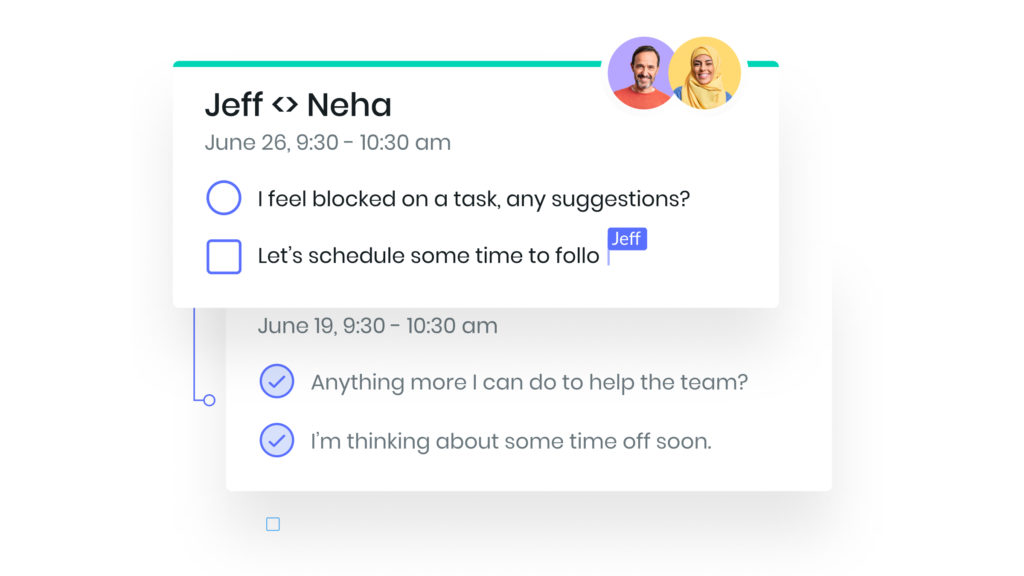
3 What’s one recent win… and one recent situation you wish you handled differently?
One-on-one meetings are all about helping your direct reports grow and develop professionally. By adding a question about their wins and their learnings in your one on one meeting template, you help them celebrate their successes and figure out what’s working and what’s not.
4 Would you like more or less direction from me?
This is one of the most important questions you can include in your one on one meeting template. It will help you find out if your employees are feeling micromanaged or lost figuring out how to do their job.
If you tend to be a micromanager, ask your employees if they’d like more opportunities to take the lead on projects or implement their own ideas. On the other hand, if your style is more hands-off, make sure to ask your employees if they’d like more direction and support from you.
In a study conducted by RainmakerThinking, Bruce Tulgan argues that the “under-management epidemic” brings huge costs to employers, managers, and employees— with only one in ten managers exhibiting the qualities of a good leader. However, he suggests a simple antidote for this issue: regular one-on-one meetings.
5 Are there any skills that you’d like to acquire in the short term?
Managers are responsible for coaching employees on the skills they’re interested in and helping them find different opportunities for growth.
For example, if your direct report says they’re interested in public speaking, you could help them find a great book, a workshop, or a mentor that can teach them what they’re looking for.
When you ask employees about the skills they want to develop, you help them create clear and attainable short-term goals.
“Developing employee skills also helps with recruiting and retaining the best employees, and it allows you to delegate so you can focus on your other roles as a manager,” says Dan McCarthy — author of the Great Leadership blog.
6 How do you find working with the team? Is there anything we can do to improve team culture/dynamics?
Great managers ask about team dynamics and look for ways to foster positive relationships and effective teamwork amongst their reports.
Adding a question about team dynamics in your one on one meeting template will help you understand if everyone feels comfortable around their teammates, and enjoys working. On the other hand, it empowers you to solve issues before they become big problems affecting the entire team, or the organization as a whole.

7 Are our meetings a good use of your time? What can we do to improve them?
One of the most common mistakes managers make is assuming that their direct reports benefit from their one-on-ones. You could be having weekly or bi-weekly meetings (and that’s great!) but they won’t be very productive if your employees are not getting anything from them.
An article published in the journal Current Directions in Psychological Science shows that the value of meetings is often questioned by employees. According to the study, employees spend an average of six hours a week in meetings, while managers spend an average of 23. (That’s a lot of time!)
At Fellow, we’ve developed the habit of asking for meeting feedback all the time. It’s an awesome way to understand how people feel about the meetings you organize and gather suggestions on how to make those meetings better for everyone.
Of course, we use Fellow’s feedback feature for that:
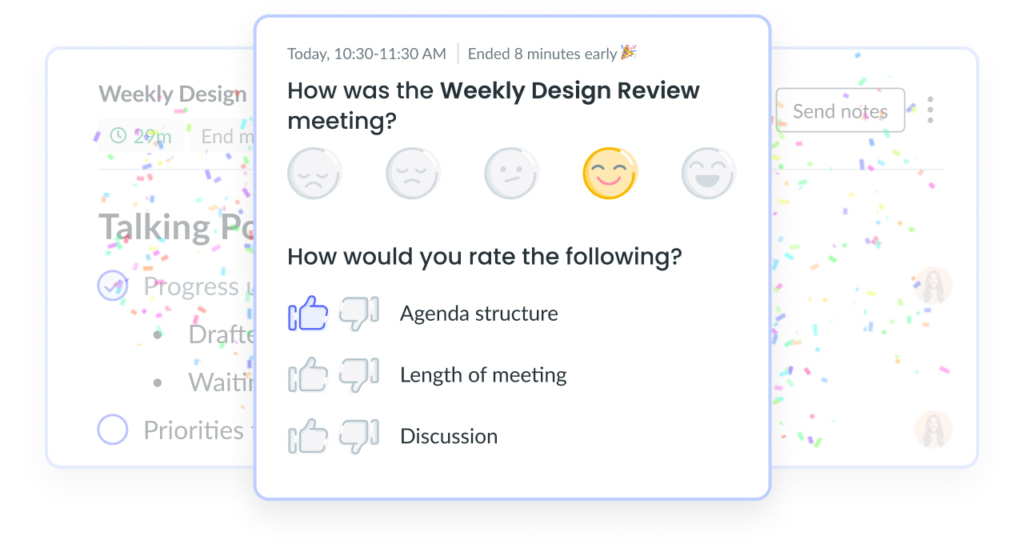
[Learn more about Fellow’s feedback feature]
8 Do I give you enough feedback?
Asking employees if you give them enough feedback will help you understand if they’d like more guidance or praise on their work.
If you’re not giving employees timely feedback (immediately after things happen), you are not doing it enough. As Kim Scott argues, the best feedback is timely — and shouldn’t only be given during stated cycles:
“The benefits of feedback deteriorate quickly. If you wait to tell somebody for a week or a quarter, the incident is so far in the past that they can’t fix the problem or build on the triumph,” says Scott.
9 What’s something I should consider changing or start doing?
Ask your team for feedback about your leadership style — even if it feels a bit awkward.
Asking for feedback not only helps you become a better manager but shows your team that you genuinely care about what they think.
Some of the best practices to ask employees for feedback include asking specific questions, encouraging employees to call you out on specific weaknesses, and rewarding employees publicly when they give you constructive criticism.
200 one-on-one meeting questions
Looking for more inspiration for your next one-on-one meeting? Check out our curated list of 200 one-on-one meeting questions for managers!

10 What are your long-term professional goals?
Having career conversations is an essential part of being a great manager.
In fact, a recent study by Right Management found that 82% of employees would be more engaged and motivated in their work if they had career conversations with their manager. Similarly, 75% said they would be more likely to stay at their current company if they received ongoing professional development coaching.
Coaching employees on their professional development not only helps you create an engaged team but is a great way to foster positive relationships and assign tasks that are relevant to each employee.
Should you ask your employee about their professional goals during every one-on-one? The answer is no. There are other things to talk about, such as weekly challenges, team dynamics, and strategies to help your direct-report on their day-to-day work.
Parting advice
One-on-ones are arguably the most important meetings you’ll have as a manager. These recurring meetings help you build trust with each one of your direct reports and serve as a great tool to check in on their challenges and priorities. Having a scheduled time in your calendar to talk about these three topics is one of the most productive and beneficial things you can do as a leader.
By using a one-on-one tool like Fellow, you’ll be able to save your own templates (or get inspired by our template gallery) so you and your direct reports can focus on having engaging conversations!







